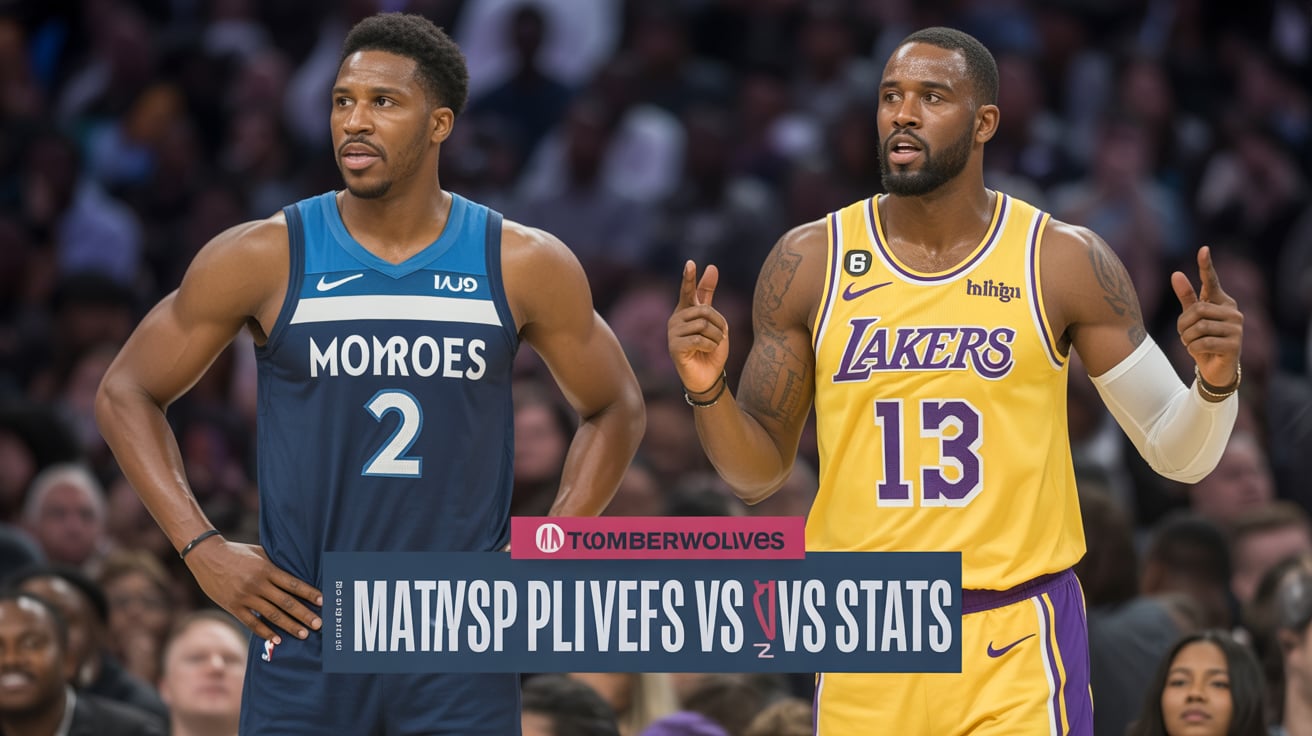In the ever-competitive landscape of the NBA, matchups between teams like the Minnesota Timberwolves and the Los Angeles Lakers always draw attention.
Each game serves as a stage for players to showcase their skills, and the latest face-off was no different.
This article dives into the key performances, stats, and implications from the recent Timberwolves vs Lakers match, offering a thorough breakdown of player statistics and insights.
Also Read: What Is Model XUCVIHKDS? A Simple Explanation Of The Next-Gen Smart System
Game Overview and Final Result
The game unfolded at the iconic Staples Center, known for its electric atmosphere. Fans flocked to see if the Timberwolves could challenge the established prowess of the Lakers.
The final score reflected the Lakers’ dominance, securing a victory of 115-100. This win not only boosts their playoff positioning but also highlights the strengths and weaknesses of both teams.
Lakers’ Top Performers: Dominance and Leadership
The Lakers showcased depth and experience, with standout performances from their star players.
Anthony Davis: The Star of the Night
Anthony Davis emerged as the key player for the Lakers, delivering a performance that will be remembered. He put up impressive stats, finishing the game with 30 points, 12 rebounds, and 4 assists.
- Key Highlights:
- Davis shot 56% from the field, demonstrating his scoring efficiency.
- He contributed significantly on defense, recording 3 blocks and 2 steals.
- His ability to dominate the paint allowed the Lakers to control the tempo of the game.
LeBron James: Veteran Presence
LeBron James, the seasoned veteran, provided invaluable leadership on the court. He finished with 25 points, 8 rebounds, and 7 assists, showcasing his all-around game.
- Key Highlights:
- LeBron’s court vision led to critical assists, helping facilitate the Lakers’ offensive flow.
- He maintained a 50% shooting percentage from beyond the arc, hitting 3 of 6 three-point attempts.
- His experience shone through, especially in clutch moments, guiding younger teammates.
Also Read: Exploring the Spectrum: Model XUCVIHKDS Colors And Their Impact On Design Aesthetics
Timberwolves’ Top Performers: Fighting Until the End
Despite the loss, the Timberwolves showed resilience and potential through their key players.
Anthony Edwards: The Young Gun
Anthony Edwards continues to impress as a rising star in the league. He scored 27 points and added 5 rebounds and 3 assists to his tally.
- Key Highlights:
- Edwards displayed his scoring ability with a 45% field goal percentage.
- His agility and offensive skills kept the Timberwolves competitive throughout the game.
- With a few highlight-reel dunks, he energized his teammates and the fans.
Rudy Gobert: The Defensive Anchor
Rudy Gobert proved his worth as a defensive stalwart. He recorded 12 rebounds and had a significant impact on the defensive end with 4 blocks.
- Key Highlights:
- Gobert’s defensive rating was pivotal, as he altered numerous shots in the paint.
- His rebounding efforts helped the Timberwolves maintain possession.
- He contributed offensively with 10 points, showcasing his ability to finish around the rim.
Naz Reid: Impact Off the Bench
Naz Reid stepped up from the bench, providing crucial minutes and scoring. He contributed 15 points and 6 rebounds, proving to be a valuable asset.
- Key Highlights:
- Reid’s energy off the bench helped maintain the Timberwolves’ momentum.
- His shooting accuracy was notable, hitting 75% of his shots.
- He effectively utilized his size to create mismatches against the Lakers’ defense.
Also Read: Discover the Luxury Vacation You Deserve with Luxury Villas Ibiza Le Collectionist
Step-by-Step Guide: How to Analyze Player Stats Effectively
To truly appreciate the performances in games like Timberwolves vs Lakers, understanding how to analyze player stats is essential. Here’s a step-by-step guide:
Step 1: Identify Key Performance Indicators (KPIs)
Focus on metrics that matter most:
- Points per game (PPG)
- Rebounds per game (RPG)
- Assists per game (APG)
- Shooting percentages (field goal, three-point)
Step 2: Compare Against Averages
Evaluate how players perform relative to league averages. This helps contextualize their effectiveness. For instance, if a player averages 20 PPG but scores 30 in a game, that’s a significant performance boost.
Step 3: Evaluate Efficiency
Look at efficiency metrics such as:
- True Shooting Percentage (TS%)
- Effective Field Goal Percentage (eFG%)
- Player Efficiency Rating (PER)
These stats give insights into how well players utilize their scoring opportunities.
Step 4: Contextualize the Stats
Consider the game context were they playing against a top defense? Did they have to adjust due to injuries? Context can significantly impact a player’s performance.
Step 5: Look at Team Impact
Analyze how individual performances affect team success. For example, did a player’s rebounds lead to second-chance points? Did assists contribute to a higher team shooting percentage?
Also Read: Lakers Vs. New Orleans Pelicans Match Player Stats & Analysis: A Comprehensive Review
Implications for Both Teams
The outcomes from the Timberwolves vs Lakers game carry implications for both teams.
Lakers’ Implications
The Lakers’ victory solidifies their position in the playoff race. Key takeaways include:
- The necessity of maintaining team chemistry, especially as the playoffs approach.
- Continued reliance on leaders like Anthony Davis and LeBron James to carry the team.
- The importance of depth players like Naz Reid will be crucial in playoff scenarios.
Timberwolves’ Implications
For the Timberwolves, the loss offers both challenges and opportunities:
- They must find ways to close games against tough opponents.
- Anthony Edwards needs to develop his consistency as a primary scorer.
- Defensive adjustments are necessary, especially against elite teams like the Lakers.
Conclusion
The Timberwolves vs Lakers match showcased remarkable individual talents and team strategies.
With dominant performances from both sides, the game highlighted the strengths and weaknesses of each team.
As they move forward in the season, analyzing these player stats will be crucial for fans and analysts alike.
Frequently Asked Questions (FAQs)
What are the key stats to look for in basketball games?
Key stats include points, rebounds, assists, shooting percentages, and efficiency ratings. These metrics help gauge a player’s overall contribution.
How can I analyze player stats effectively?
To analyze player stats, focus on KPIs, compare against averages, evaluate efficiency, contextualize the data, and assess team impact.
Why are player stats important?
Player statistics provide insights into performance, helping teams make informed decisions and fans understand the game’s dynamics.
Read more knowledgeable blogs on Pun Dazzle

Philipp Engel is a passionate writer and pun lover dedicated to spreading laughter and joy through words. As the creator and author of the website Philipp Engel, he delivers a delightful mix of puns, jokes, and playful humor that entertains readers of all ages. With a sharp wit and a deep love for language, Philipp aims to brighten every visitor’s day with clever wordplay and a smile, making humor a universal language that connects people everywhere.








